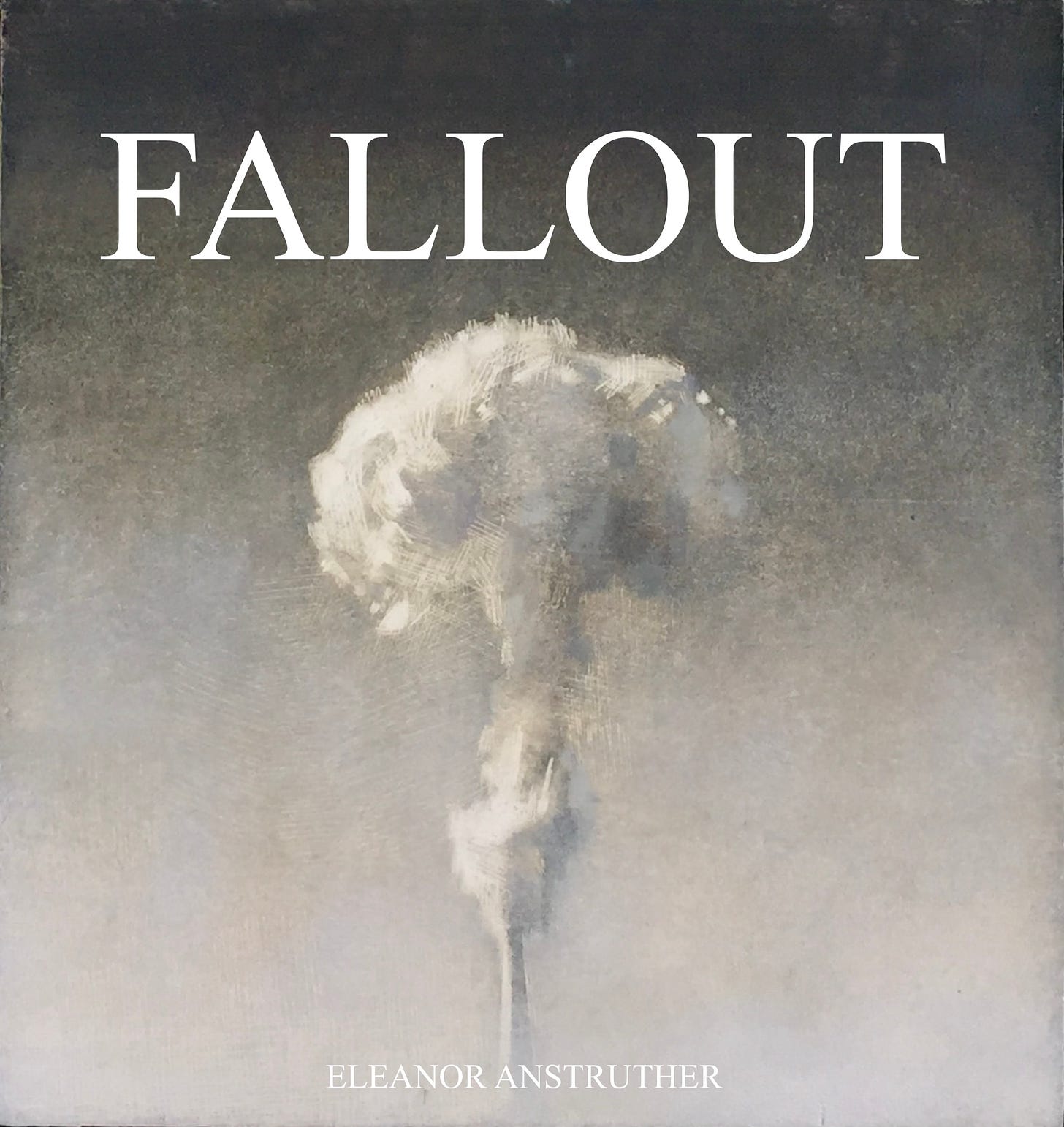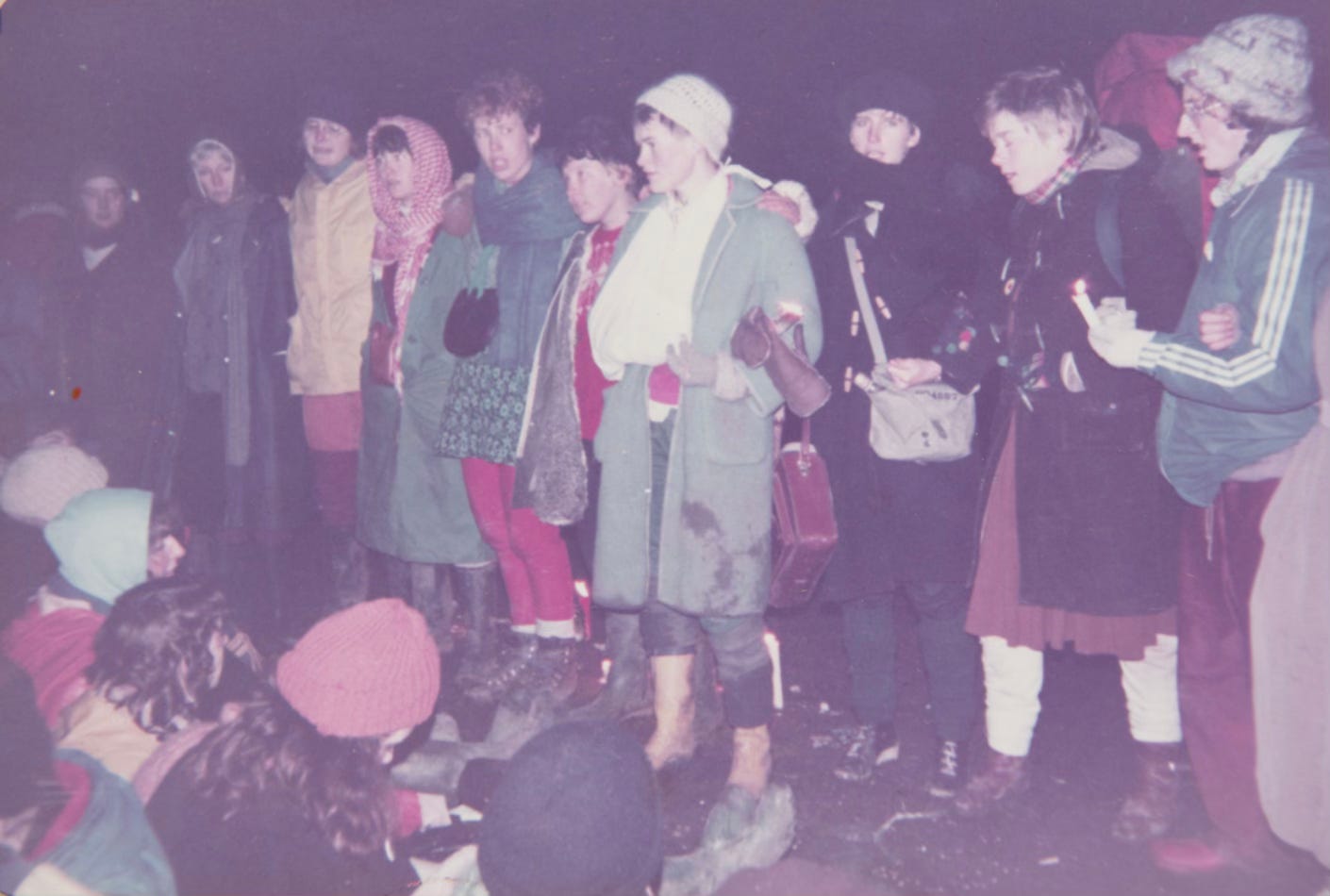The woman with the clipboard was writing lists. The woman who’d wanted weed was leaning toward her, trying to read them upside down. The rest of the women, the group round the fire, were dispersed into their own conversations. Janet had a good mind to do some clearing up. There was rubbish blowing off the top of a pile by the road, a piece of cardboard cartwheeled across the muddy ground. It caught on the standpipe where Janet had seen Bridget the first time she’d tried to get her back, when she’d watched her tip her head under the rushing tap and shake her hair like a wet dog and thought, That can’t be her but it was; her little Bridget who’d make such a fuss about washing under the tap when they were camping, who’d insist Janet boil a kettle on the paraffin stove and pour it in the tin bucket so she could hide behind the tent with a flannel and wash without screaming.
Using a stick and a cloth, Janet carried the blackened kettle from campfire to standpipe where she gave it a quick rinse and refilled it. Then she found some mugs and washed them, too. From her bag she retrieved the cake; as she sliced it up, a board on her knee, a knife that she’d scraped clean with her fingernail, a bus drew up disgorging women into the camp. Janet found herself handing out lemon drizzle as the new arrivals gathered at the fence. By the time she’d made her third round of teas she wished she’d brought her tabard.
A Black woman stopped her. She had a badge pinned to her jacket which read, Wages for Housework. Janet let herself be persuaded to sit down.
“She’s been here months and she won’t come home.” Janet scrabbled for a bit of tissue from her pocket. The fence, the concrete, the tarmac, the gates, the empty order of men and somewhere her Bridget, soft and young. “She’s got herself all mixed up.”
“Maybe this is home.” The woman had a soft American accent. She wore a bandana, tied at the back.
Janet started to cry. This woman was too certain, the wind too gentle, the fence too harsh, the smoke from the fire too difficult in her eyes. She wanted an end to war and husbands and children who ran away. She wanted her life back.
“You can stay in my place, if you like.” The soft American voice made everything sound comforting. She pointed at an old ambulance parked next to the bus that had disgorged the women.
“I’m not staying,” said Janet.
“I thought you wanted to get your girl.”
“My daughter.”
“Well honey, she’s here somewhere.”
Here somewhere, she could be anywhere, none of the faces were Bridget.
“I’ve got a son at home.”
“And a husband?”
“I have to get back for him.” Janet blew her nose. “He’ll be wondering where I’ve got to.”
The woman reached out and held the top of Janet’s arm; firm and comforting, it sent tingles down Janet’s spine. She had a flash of being taken up in the arms of her, of being carried to a bed of silk and feathers, of being warmed by the touch of her skin. She couldn’t help noticing she wasn’t wearing a bra. A lilac t-shirt under an open jacket, it didn’t look warm enough.
“You don’t have to put up with it, honey. Look at me. I don’t know you from a blade of grass, but I know your life. Wife, mother, dinner on the table, sex when he wants it?”
“Chance’d be a fine thing.” Janet blew her nose.
“You don’t have to do it.”
“I wouldn’t mind.”
“It’s a power trip.”
“If he’d only take me out now and then.”
“You’re a chattel.”
“A what?”
“A possession.”
“I just want my girl home,” said Janet, mesmerised by the hand that softly stroked.
“You got to wake up.”
“He’s not a bad sort.” She started crying again.
“Sure.” The woman withdrew her hand. “You keep thinking that while you pick up his pants and wash his dishes and do the laundry and feed his kids and open your legs and put up with his shit while he goes about doing exactly as he pleases all day every day. You own your house? You own your car? Honey you don’t even own your kids. He owns all of it. You think you were put on this earth to serve him? Like that’s what you were made for? I bet you call yourself lucky, a husband, a home, like it’s all a girl could want. You ever think what would happen if we said no?”
“No to what?”
“To all of it, starting with the housework. We’re slaves, all of us, we knew it and you didn’t, we won liberation from you only to find ourselves enslaved by our own men, slaves again right there alongside our white sisters.”
Janet dared to touch the badge on her lapel. She tapped it with her nail.
A soft American voice, “It’s what it says. Wages for housework. They want us to work? They ought to pay us.”
Janet laughed, an involuntary scoff, she put her hand to her mouth.
“You think that’s crazy?”
“I think you’re dreaming.”
“Dreams is where change happens. Railway workers, trash men, teachers, nurses, they all get paid, they have unions, they go on strike. Are you happy with your working conditions? You feel your work is appreciated?”
“Not today I don’t.”
“Not you, not me, not millions of women out there. A union would give us recognition of the collective body. You imagine a man working for free? They strike for recognition, so why shouldn’t we?”
“We’d starve for a start.”
“That’s the point. I bet you get asked if you have a job and you say, No, I’m a housewife.”
“I do have a job actually.”
“Whatever you do on the outside, you work in the home. Housework is work. Unpaid, unregulated work. We go out to work, we come home to work.”
“I won’t say you haven’t got a point.”
“We have the power,” she took Janet’s hands and turned them over. “We have the power right here.”
Something was happening behind them. Women were emerging from all over camp, getting up from the fire, converging on the gates; a rolling wave that landed bodies at the fence. The woman, Monica; she said her name as Janet turned to see, she said, I’m Monica as if being Monica was the best thing in the world. She swung her arm over Janet’s shoulder as Janet turned around and moved her simply. A chant began, voices raised as one, Monica took Janet with her.
A line of police formed along the road, trucks turned in from the roundabout, horns honked, and men leaned from windows. Before she knew it, Janet was ten bodies deep in a sea of anoraks and woollen coats, hats and scarves and muddy boots, unbrushed hair and dirty faces, skin shiny with life beyond walls. Monica was gone, she looked for her, her arm replaced by other arms, by other women who smiled and held her linked to them as if they’d known her all their lives, a sisterhood that Janet remembered from childhood when her actual sister would take her arm and they’d go skipping, a unity she’d forgotten in the years that marriage had separated her; children, Ray, a house in Surbiton that her mother had said she should be grateful for, a job she was lucky to get, that she’d thought would give her a bit of independence, a bit of money of her own, something to get her out of the house after years stuck in it with a growing baby who’d left her no time to paint even though she’d thought she’d have plenty of time, even though she’d had to give up on night school. She’d held the tiny bundle of Bridget and had it all mapped out, It’s perfect, Ray and not just Bridget but how she’d thought her married life would be, hadn’t known that babies take everything and leave nothing but the clearing up, that she’d be too tired to go into the room she’d put aside for painting, that she’d be pregnant again with Paul just when Bridget had got the hang of tying her own shoelaces.
Gates blocked, bodies low, voices raised, police lined up, squaddies through the wire. Janet picked up the words that looped about her, that repeated from this sisterhood that had looped her in.
Out of the darkness comes the fear of what’s to come / out of the darkness comes the dread of what’s undone / out of the darkness comes the hope that we can run / out of the darkness comes the knowledge of the sun.
She’d always been good at singing.







Love Janet’s choices here. And that song! Echoes of the St Francis prayer I’ve been reflecting on — darkness and hope and light.
Final lines. That’s another of your craft skills I’m in awe of.
Damn, this is a very good chapter.